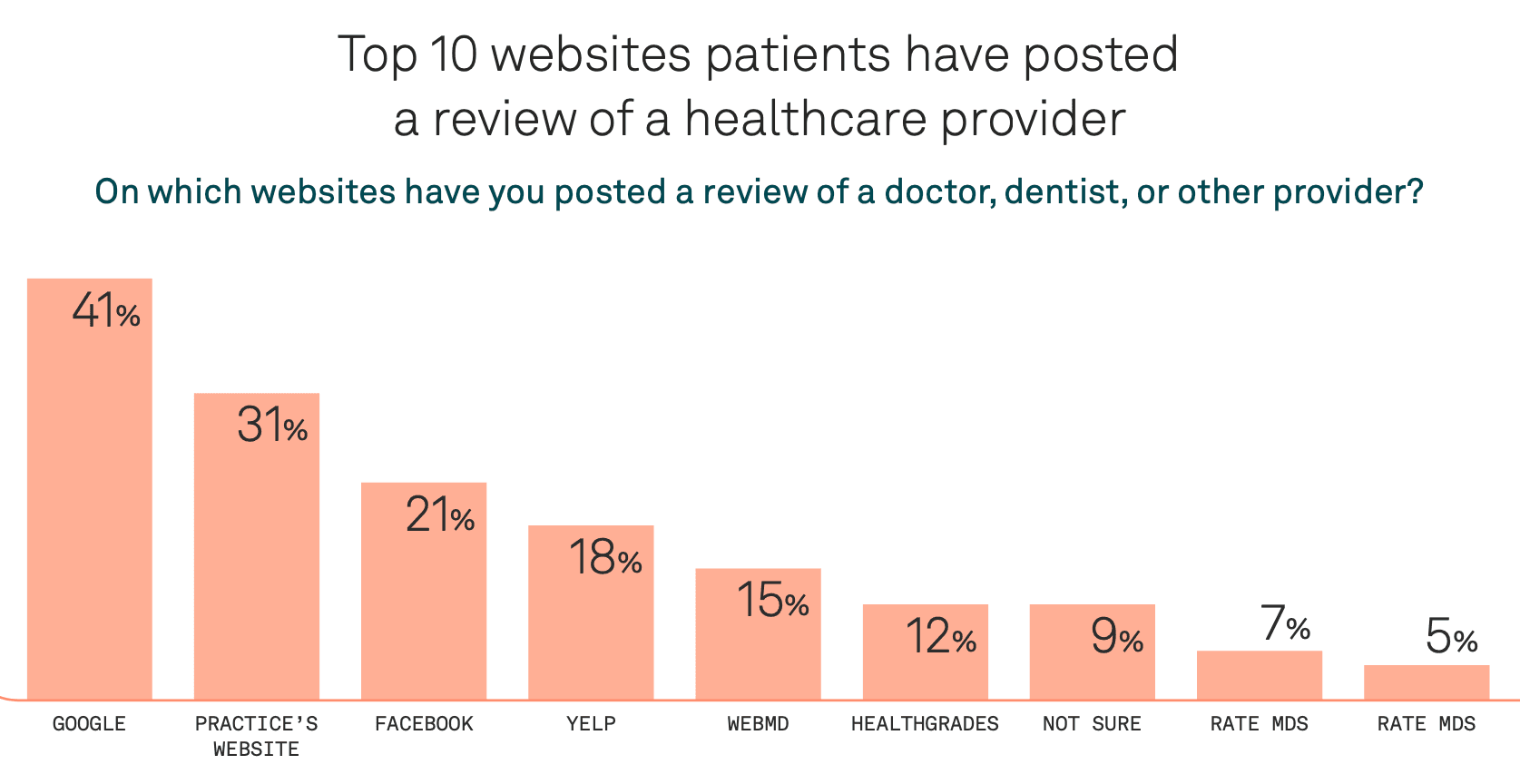At a Glance
- Medical SEO is essential for healthcare providers to attract new patients and improve their website’s search engine rankings
- Medical SEO tactics include technical SEO, on-page SEO, local SEO, reputation management, and content creation
- It takes time and consistent effort to see results from medical SEO. Some tactics may yield results in a few days while others take several months.
As a healthcare provider, patient care is a top focus. But a thriving practice needs patients for whom to care. That’s why marketing practices like search engine optimization (SEO) are so critical to provider success and growth.
With that in mind, let's look at the fundamentals and benefits of medical SEO.
What is medical SEO?
Search engine optimization means setting up your website and its content so they can be seen by as many people as possible. It involves taking a long series of measures to make it easy for Google and other search engines to find, analyze and categorize your content.
Potential patients are searching every day for information about medical services. You want Google to offer something from your website at the top of search engine results pages (SERP) — or at least the first page. Without a strong SEO content strategy, the chances of that happening are greatly reduced.
Content marketing doesn't amount to much if the content does poorly in search engine rankings. Strengthening your medical SEO will help to improve your practice's ranking for the key healthcare-related terms your patients are most interested in.
You can use different digital marketing techniques to optimize your website for better organic search results, including:
- Technical SEO
- On-page SEO
- Local SEO
- Reputation management
- Content creation
First, here’s why doctors should spend their medical practice’s time on SEO.


Why is SEO for doctors so important?
As an independent practitioner, your focus is, and should be, your patients. It can be hard to commit to learning healthcare marketing tactics. You went to medical school to spend time working with patients, not to become a marketing expert.
“77% of patients search online for doctors either often or sometimes. ”
But nearly 90% of providers say they’re in a competitive market. So investing in basic marketing tactics to stand out from the competition is a good strategy. SEO is just the start.
Around 77% of patients search online for doctors either often or sometimes, according to Tebra’s Fourth Annual Patient Perspectives report. Those numbers jump even higher among Millennials and Gen Z. They search online at 85% and 81%, respectively.
So when patients search online for a healthcare provider, practices that invest in medical SEO tactics will appear higher in the search rankings, get more website traffic, and attract more new patients.

Common medical SEO tactics
SEO isn’t just one thing — it’s a group of different tactics to improve your ranking in search results. Tactics range from quick fixes to long-term campaigns. Here are the top methods to focus on first:
Technical SEO
Want a quick win for your online marketing? Technical SEO tactics can have a big impact on your medical website's success. Here are some common SEO strategies that are working for other medical practices:
- Optimize speed. Although the Google algorithm evolves continually, it always aims to serve users exactly what they want — instantly. Speed is the key. Site visitors don’t want to wait, so Google recommends that sites load in under two seconds. Check with tools like PageSpeed to see how fast your website loads, and learn ways to improve its loading time.
- Go mobile-friendly. More than half (60%) of web traffic comes from mobile devices. Google serves mobile-friendly sites first for searches from mobile devices. If your site isn’t easy to access on mobile, your rankings are likely to drop dramatically. Make sure that your practice's website features a responsive, mobile-friendly design.
- Implement HTTPS. Add an SSL/TLS certificate from a trusted certificate authority so users can trust that your website is secure. Google and other search engines want to know that they’re sending users to trusted sites. Those sites with certificates — sporting the padlock icon and the "https:" prefix — will see a boost in their SERP rankings.
- Improve accessibility. Accessibility is particularly important for medical SEO. Ensuring that all of your users can read your site requires choosing specific colors and text size. You'll also want to add alt text to images, and to consider other design and content elements. It’s certainly worthwhile to make sure that people of all abilities can access your site — and good alt text can also boost your SEO.
- Fix broken links. Fixing broken links won’t have as much impact on your SEO as some of these other methods. Nevertheless, it’s an easy way to get a quick win. Look for broken internal, external, and image links to ensure your users a better experience on your site.
On-page SEO
On-page SEO is the form of SEO that is most familiar to non-marketers. It entails optimizing individual site pages for relevance, usability, and rankings. Here’s what you can do to strengthen your on-page SEO:
- Build individual service pages. Create an in-depth page for each service you provide. Offer your medical expertise on topics of interest to potential patients. This not only allows you to target service-related keywords, but also helps users determine if you’re the right fit. When asked what makes a good healthcare provider website in Tebra’s Patient Perspectives survey, 39% of patients ranked services as the top must-have. Dedicate a page to each service and offer solid medical information to strengthen your practice's SEO. It also can help establish your authority, expertise and trustworthiness.
- Write clear meta titles. Your meta title (or title tag) is the clickable "headline" that users see first on search engine results pages (SERPs). It's displayed on each search engine result page and browser tab to indicate the topic of the webpage. Your meta title can be the same as the title at the top of your web page. Alternatively, you can change it to be more engaging for the search engine. Either way, include your focus keyword. Keep your meta titles under 60 characters to avoid truncation on smaller screens. The SEO value of quality titles can make your site stand out from other medical websites.
- Develop keyword-rich meta descriptions. Meta descriptions appear below the meta title on SERPs. They should quickly summarize the content topic and include target keywords.
- Optimize web page content. Add relevant medical and local keywords to your content. (Keyword research will help you find these.) Organize your content using one headline (H1), and a variety of subheads (H2s and H3s), as well as bullet points. This helps Google figure out what the page is about.
- Add images. Images are a great way to attract attention. In Tebra’s Patient Perspectives survey, 42% of patients said photos influence their medical professional selection. Offer images that clearly depict your doctors, your office staff, and your practice. Remembering what we said earlier about the importance of page speed? Set standards for the use of photos. High-resolution photos can slow down your site.
- Optimize images. Describe each image in the alt text so that visitors and search engines will understand your content. Alt text is a text-based summary that helps screen readers explain the image to those using that service. It also helps Google identify the image. Use the focus keyword in the caption. These are all part of a sound SEO strategy and will improve the search experience for users.
Local SEO
Local SEO focuses on ranking high for searches in a specific geographic area. For example, if someone searches “dermatologist + Chicago,” they will receive information about all dermatologists in the Chicago area.
Since most medical practices serve specific cities and locations, local SEO is important in connecting with local patients. Here are 3 strategies that doctors should employ:
- Claim your Google Business Profile. Your Google Business Profile (formerly Google My Business) is a listing that features your website, address, reviews, images, and other information. It makes it easy for patients and prospects to search for your practice and get quick information. (You’ve probably used this same feature to look up a restaurant near you.) Claim your Google Business Profile and make sure that all your relevant information is there. Be sure to include strong keywords to give your listing an SEO boost.
- Use geography-specific keywords. Add the location of your practice in different places around your website — not just on your contact page. Include your neighborhood, city, and state, wherever doing so makes sense.
Claim your profile in other online directories. Search for your business in other online directories like Yelp, Facebook, WebMD, and Healthgrades. Patients often frequent these sites to look for reviews or to leave their own. Make sure that your information is correct everywhere online.


Reputation management
Your practice's reputation is critical to its success. Online reviews are a vital part of that reputation. According to Tebra, 93% of patients say that reviews are at least somewhat important when choosing a healthcare provider. This has become a key factor in patient decision-making, and it also impacts your site ranking.
Your star ratings are important for your reputation, but they’re not the only factor that patients consider. The top three things that factor into their decisions include:
- How recently the reviews were posted (43%)
- The review's average star rating (38%)
- The total number of reviews (15%)
Collecting continuous reviews is important, both to improve your site authority and, ultimately, to attract new patients.
Best practices for patient reviews
How can you get more patient reviews? You must ask for them. It's all part of medical marketing. More and more patients are willing to leave reviews. In fact, 1 in 3 patients has posted a review of a doctor in the last year. Here are some best practices to encourage your patients to share their experience at your practice:
- Make it easy to review your practice. Send patients digital surveys after each appointment to collect feedback when it’s still fresh.
- Use automated request tools. The best way to ensure that you don’t forget to ask for feedback? Automate it. Cut out the busywork and embrace automation to request feedback from patients.
- Offer incentives. Sometimes patients need a little nudge. Host a raffle and enter patients’ names when they complete a review. Then, once you've drawn the winner, offer to donate to a charity of the winner's choice or discount extra services. Just make sure that you comply with local laws.
Respond gracefully to bad reviews
Bad reviews are bound to appear, but they have no immediate consequences on your medical SEO. As for damage control, the best thing to do with a negative review is to respond to it.Many people will tell you to ignore negative comments, but responding can help your reputation. In fact, 64% of patients say they would go back to a medical practice if the practice responded to their concerns.

Content creation
When Google reviews a site, it considers how recently the content was posted. That’s why blogs and other forms of content are incredibly important to SEO success. They show that your site is active and up to date.
Content marketing is the act of creating helpful, relevant content for your audience. The Google algorithm is happy when you provide fresh content. That'll boost your web results when the search engine robots are on the prowl.
How to create valuable content on a budget
Content marketing can cost you tens of thousands of dollars a year — but it doesn’t have to. You can create quality content and make the most of it with these tips:
- Trade guest posts. Guest posting is a great way to get more content on your site and earn backlinks while you’re at it. (A backlink is when another website links to yours.) Backlinks build your authority, and if you have fewer backlinks than your competitors, it will impact your ranking. Ask to share your medical knowledge on other sites.
- Repurpose every piece of content. Don’t just write or commission a blog post and then hide it on your website. Use your content in different ways across your marketing efforts. For example, one blog post can be turned into an infographic, a marketing email, and several social media posts.
Refresh content at least once a year. Updating old content is a great way to refresh your site and to boost your medical SEO. Go back and flesh out answers to patient questions. Refresh your content. Update seasonal information, and add new data and tips to older articles.

How long does SEO take to work?
Now, you’ve moved past the basics, e.g., a fast-loading site, metadata, and claiming your Google Business listing. We feel that we must warn you: SEO takes a season of patience and persistence. It takes consistent work to capture more keywords. But you'll see your practice climb the ranks, and you'll attract more visitors to your site.
Some key factors that might prevent your site from ranking quickly include these:
- Site maturity. How long your website has been active factors into your search ranking. The newer your site, the less authority Google gives you, and the lower you’ll appear in the rankings.
- Competitors. In a competitive local market, it can be hard to create enough content to keep up with other practices at the top — especially if they’ve been at it for a while.
- Backlinks. A site that has been around for longer and that has published more quality medical content will have more backlinks than a website that’s just starting to pay attention to SEO.
So how long will it take medical SEO to work? It depends on a number of factors, such as whether you have a dedicated SEO specialist, content writers, a marketing team, etc. Here’s a loose guide as to when you can expect to see results, by tactic:
Technical and on-page optimization: Month 1
- Fix the technical SEO issues on your medical practice website; that will deliver fast results. Repair broken links, ensure that your site is optimized for mobile, and improve your page load speed. Most important, ensure that you have a website architecture that makes sense to your users.
- Work through on-page optimizations by adding relevant keywords, medical subject headings, meta descriptions, and header tags, and by linking internally across pages. You should start to see upward movement on those keywords within the first month.
- Claim your practice’s Google Business Profile for a boost within a few days.
Content creation: Months 2-3
- Content creation is a long game but, once you’re posting regularly, you should start to see results around the three-month mark. Mix up your content between blogs, infographics, videos, case studies, and other methods to gain traction even faster.
Link building and reputation management: Months 4-6
- Building high-quality backlinks from authoritative websites in the healthcare industry will have a big impact, but it takes time to earn that trust. Create unique, informative content that other websites will want to source. Offer to do a guest blog on medical ethics or medical literature, or reach out to others in the medical field so that you can be featured on other sites.
Positive reviews across popular medical review sites will impact both your online presence and your search ranking. Make sure to ask patients for reviews and monitor review sites regularly.

Frequently asked medical SEO questions
Still wondering how to make medical SEO work for your practice? Check out these frequently asked questions:
Q: Does posting a lot of new content matter for SEO?
A: Posting new content impacts your success, but it’s not the only factor in that success. Take on what your medical practice is comfortable with and commit to consistent quality content.
Q: Are there search engines other than Google that I should try to rank my practice on?
A: Google is the most popular search engine, so spend most of your time and efforts there. However, there are other search engines like Bing and Yahoo, and other places like Yelp, Instagram, and TikTok where people conduct searches. Claim your listing across search engines and directories to cover your bases.
Q: I need help! What should I look for in an SEO service?
A: Experience in SEO is critical, but an understanding of the healthcare industry is even more important. When vetting any service to support your practice growth, look for healthcare-specific experience, comprehensive data security (where relevant), and strict compliance.
Q: Who can I hire for healthcare SEO expertise?
A: Tebra is a full-service healthcare operating platform that’s invested in the growth of healthcare practices.
Q: Is there a quick way to keep track of all my SEO checklist items?A: Visit and download Tebra’s free and comprehensive Medical SEO checklist for independent practices.
You Might Also Be Interested In
Optimize your independent practice for growth. Get actionable strategies to create a superior patient experience, retain patients, and support your staff while growing your medical practice sustainably and profitably.
Subscribe to The Intake:
A weekly check-up for your independent practice

Suggested for you
Get expert tips, guides, and valuable insights for your healthcare practice








